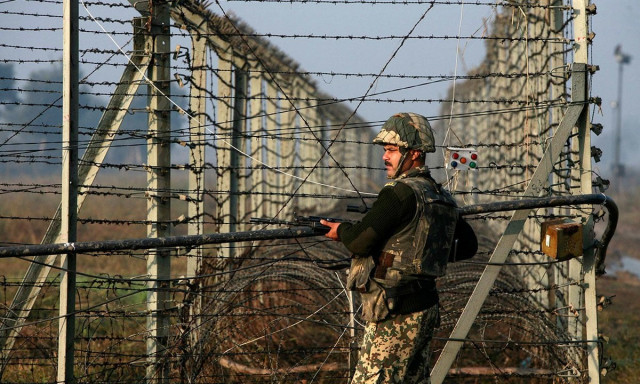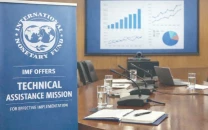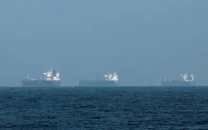Playing the proxy game
It’s not who plays the proxy game, but who plays it better. We don’t. That is the real problem.

PHOTO: REUTERS
But let’s step back for a moment and inhale the noxious fumes of a narrative that paints Pakistan in the starkness of black and white while draping others in subtle shades of gray. The lovingly-weaved narrative spins its silky web in these words:
Pakistan harbours and nurtures Non-State Actors who sneak across borders to unleash violence as an extension of Pakistan’s policy. Deliciously acronymed and jargonised by policy wonks as NSA, these people fall within the definition of terrorists and since they are based on Pakistan’s soil, the State of Pakistan is by default peddling terror as state policy. The villain of the piece — any piece by this definition — is Pakistan and Pakistan alone.
Islamabad, we have a problem.
But wait. New Delhi too has a problem. In fact, it’s a huge problem, probably the size of Kashmir. And this particular problem cannot be solved by banning it, proscribing it, dismantling it or even liquidating it. No ladies and gentlemen, this here is New Delhi’s brain tumour that has begun to show on the outside.
It’s the framing of our respective problems that skews it for us. The contrast could not be sharper: in the international legal context, Indian Occupied Kashmir is a human rights and right of self-determination issue; in the international political context, Indian Occupied Kashmir is an NSA-perpetrated terrorism issue. In the legal context India should be the villain; in the political context, Pakistan is painted as the villain.
Let’s take it further: The legal context derives its strength from UN Security Council resolutions on Kashmir that called for the people of the State of Jammu and Kashmir to decide through a plebiscite if they wanted to join Pakistan or India. Despite what Indians may claim, these resolutions still hold value and provide legitimacy to the present-day struggle of Kashmiris against India. In an incisive column that appeared recently, legal expert Dr Sikandar Shah reminded us that international human rights law allows the people of Occupied Kashmir to agitate against the occupation army of India for their UN-validated right of self-determination. He and many other experts correctly argue that since the State of Jammu and Kashmir is a disputed territory, Indian security forces in Occupied Kashmir constitute an occupation army and the people of Kashmir as lawful combatants who have the legal right to wage a struggle against India’s occupation army. This struggle can also entail armed resistance.
You can see where this logical argument leads to: Kashmir does not belong to India under any law (including the dubious Treaty of Accession) and Kashmiris who agitate against India in any form are not terrorists by any legal definition.
But non-Kashmiris? Here’s where we turn to proxy games that nations play.
These games are well known. Throughout ancient and modern history, nations have used all means at their disposal — including proxies of all types — to pursue hard national interests beyond their borders. Distant wars waged by the United States and its allies in Europe and the Middle East have always featured local proxies in prominent roles — as have coups, uprisings, and revolutions supported by external players. Big and not-so-big powers have generously used proxies as conduits for arms, information, propaganda, and sabotage.
But rarely do proxies have organisations, offices, premises, titles, and formal patronage. Those who play the proxy game well play it quietly. Those who play badly play it with trumpets blaring. Need I say more?
Today those in the West who are piling pressure on Pakistan for harbouring the likes of Lashkar-e-Tayyaba (LeT) and Jaesh-e-Mohammad (JeM) are essentially insinuating two things to us: 1) You are not supposed to harbour proxies on your own soil; 2) Because you do, we have no choice but to make you shut them down. What we can insinuate from this is: a) We should be like all the others (including India) and base our proxies somewhere else where they stay well away from the glare of international attention; b) Once this is done, we can wink and nod at each other and all play the proxy game staying within the confines of the unsaid, unwritten and unacknowledged rules.
Then everyone can fight happily ever after.
Now imagine this scenario in Pakistan. There are no Non-State Actors based in Pakistan after their organisations are disbanded and their members disarmed, de-fanged, de-radicalised and blended back into society. FATF issues get ironed out, threats of sanctions evaporate and the terror tag presented to us so judiciously is ripped up and flung into the nearest diplomatic dustbin. We can smile and smile and not be the villain.
Now imagine this scenario in India. Lashkar-e-BSF, Jaesh-e-CRPF, and Hizbe-RAW continue with their blood sport in Occupied Kashmir. Together with the Indian army, they remain an occupation force that goes about its business of brutalising the people of Kashmir, tying them on bonnets of jeeps, dragging their broken bodies behind military vehicles and humiliating young Kashmiris by making them rub their noses in the dirt. The Kashmiris keep defying them with words, actions — and yes arms. Kashmir continues to burn ferociously because India sees it as a law and order problem that can only be solved through suppression.
Except now, there is no Pakistan to blame. And that boy from Pulwama with the gun, he is fighting his war for the right to self-determination given to him by the United Nations. And that girl from Uri with the IED, she is waging her war against enemy combatants of the Indian security forces who have killed her parents, tortured her brother and raped her sister.
This would be a powerful narrative except that today this is the actual reality. The problem is that this reality is not supported by the narrative it deserves. This narrative is missing because we did not play the proxy game as the rest of the world plays the proxy game. Flip the game, flip the narrative and the villain will change.
Islamabad and New Delhi each have a problem. But there is a difference: we can solve ours because it is staring us in the face. They cannot solve theirs because they do not have the courage to admit that it even exists.
Advantage Pakistan.
Published in The Express Tribune, March 10th, 2019.
Like Opinion & Editorial on Facebook, follow @ETOpEd on Twitter to receive all updates on all our daily pieces.















COMMENTS
Comments are moderated and generally will be posted if they are on-topic and not abusive.
For more information, please see our Comments FAQ